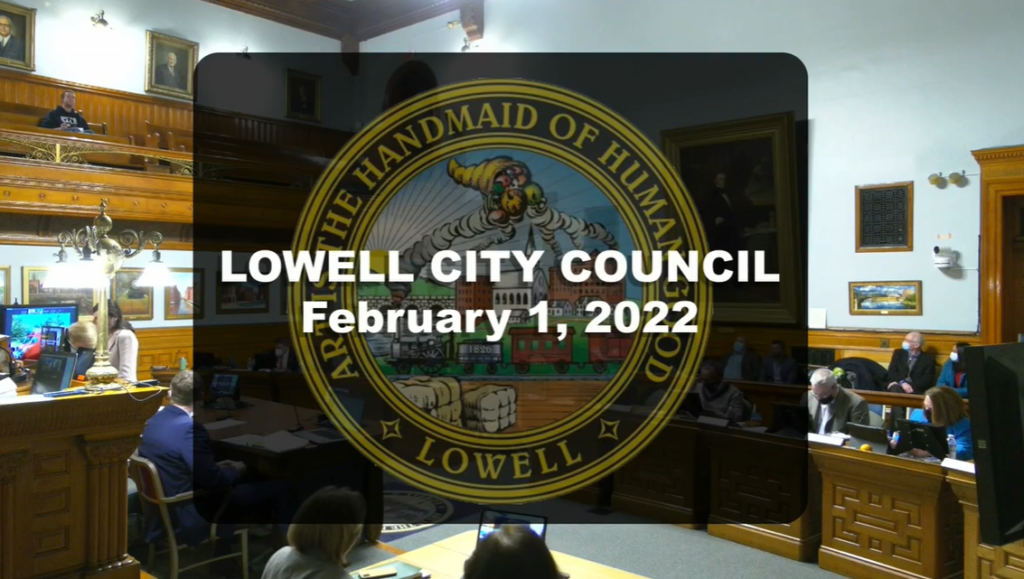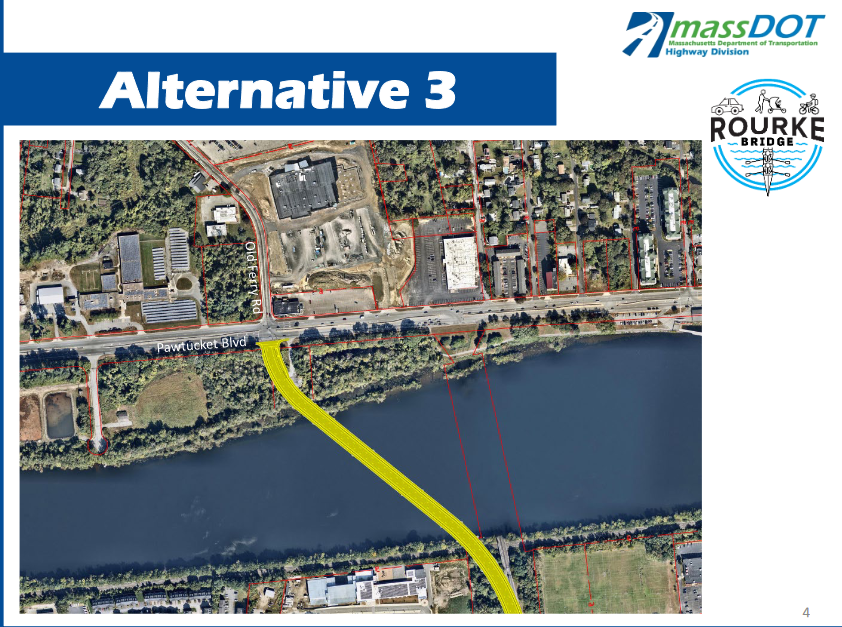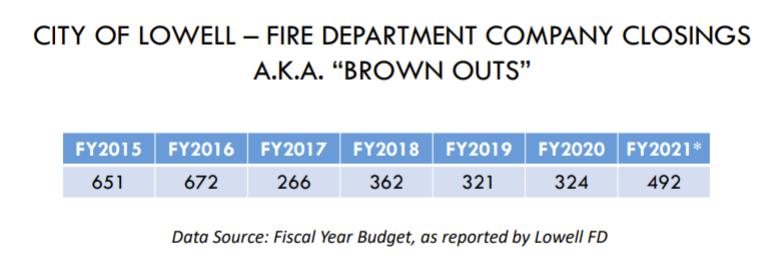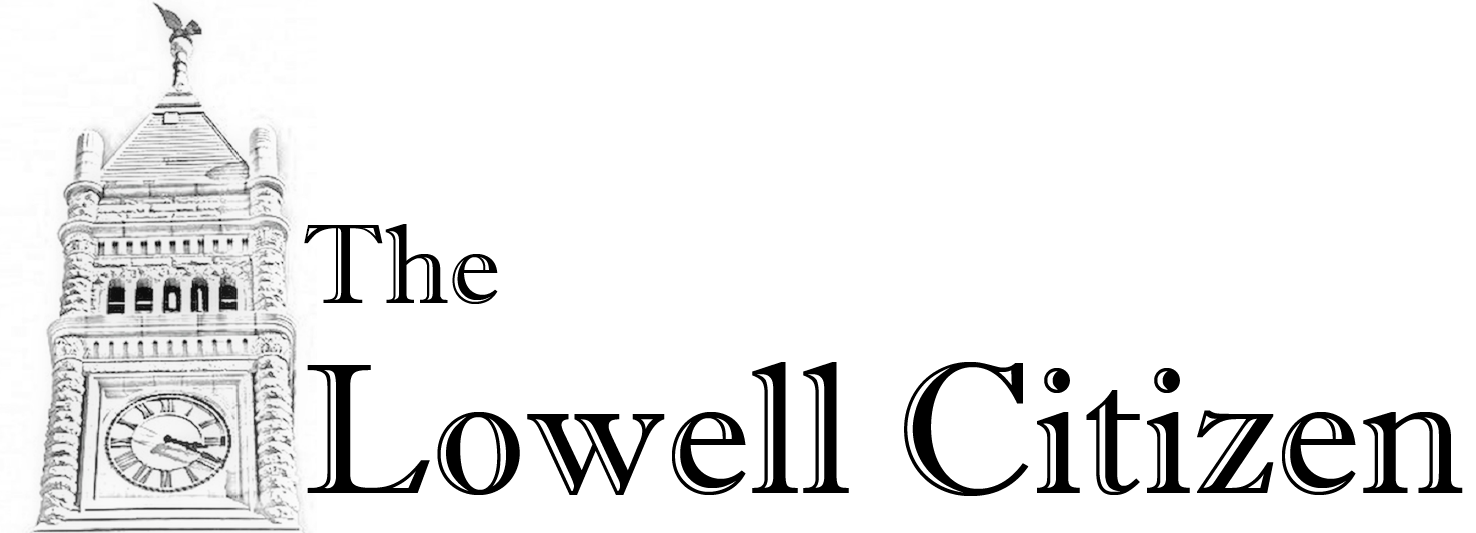
1. MORE ROURKE BRIDGE
Motion response to the following recent motions relative to the Rourke Bridge:
C. Rourke – Req. City Mgr. Contact MassDOT Concerning Rourke Bridge Inspections And Any
Upcoming Plans For Redesign And Construction Of New Bridge
C. Robinson/C. Rourke – Req. City Mgr. Contact MassDOT And Request Emergency
Inspection Of The Rourke Bridge, To Provide Any And All Weight Restrictions That Might
Apply So The City Can Post Accordingly, And To Also Request To Place Bridge Into The State
Transportation Improvement Program.
Specifically, recent actions undertaken by the city, state delegation and Rep. Trahan to move forward on a new bridge.
Why it matters: Social media chatter often places the blame on the city for the current condition of the bridge. However, this is a state problem that also requires federal funds. In order for the project to be funded, it will need to be included on the State Transportation Improvement Plan (STIP), a yearly report produced by MassDOT outlining investments in infrastructure projects throughout the state. City representatives have been pushing to get on the STIP list. Councilor Rourke suggested that news could be coming this Thursday. Indeed, following the meeting, I came across this tweet:

The preferred design (aligning the north side of the bridge with Old Ferry Road), has an estimated price tag of $169 million:

Accordingly, both state and federal funding will be essential to get this project off the ground. Hopefully, Gov. Baker will bring good news with him on Thursday.
In the meantime, the City has pushed the MassDOT for an emergency inspection. Councilor Gitschier moved for the city to consider a private inspection, independent of any state action.
2. FIRE DEPARTMENT BROWNOUTS
A report was filed in response to a motion by Councilor Robinson seeking an update on the current status of the City’s plan to mitigate and/or eliminate brownouts. A brownout is when companies are shut down to save money, stretch resources, and compensate for budget and/or staffing shortfalls.
Why it Matters: This issue came up about a year ago, and was the subject of a report and a special meeting of the council. What stood out at the time were the improvements made by the city in reducing brown-outs. In 2015 and 2016, during Kevin Murphy’s administration, the city had 651 and 672 closings, respectively. Thereafter, those numbers dropped considerably (as explained here) – but again began climbing when Covid entered our lives:

The city has thrown considerable sums of money at this issue. As per this meeting’s report, the FY2022 budget for overtime in the Fire Department (“LFD”) was increased to $1.1 million. In the prior year (FY2021) the overtime budget for the LFD was $750,000. The five-year average for actual annual overtime expenditures in LFD between FY2016 – FY2020 was $839,929. Further, early in FY2022, a supplemental appropriation of $1.5 million was recommended and approved by the City Council at the regular meeting on December 7, 2021, prior to setting the revised budget in the general fund for OT is $2.6 million. Last night, councilors and the administration were quick to point out these efforts.
3. PARKING KIOSKS
A discussion was held relative to a response filed to a motion by Councilor Robinson seeking parking kiosk maintenance. The City currently has 176 kiosks covering over 1,800 on-street parking spaces. The kiosks are currently running at approximately 50% capacity (down from 90% a few weeks ago). There are a number of factors at play for the recent downturn, including weather and personnel shortages. The Parking Department, in conjunction with our private vendor, LAZ Parking, will take steps over the coming weeks to attempt to remedy the situation. In addition, as the kiosks are at the end of their life-cycle, options for replacement are being explored.
Why it matters: Parking meters (or kiosks) are critical for managing parking supply and providing revenue. If someone using a metered spot has only a 50/50 chance at finding a working kiosk, it’s not difficult to assume that they will give up and skip the payment. It’s unreasonable to expect people to hunt for a working kiosk, especially during the winter. As a consequence, half of our most convenient parking may be given away for free due to mechanical failure. Equally depressing, the majority of our kiosks were financed by a loan order in 2013. Following questioning from Councilor Gitschier, it was confirmed that this loan has not yet been paid off and will not be at the time of equipment replacement. The Parking Department has worked with the City Manager’s office to develop a financing plan that includes funding for new kiosks.
The parking department is an Enterprise Fund established under MGL c. 44, § 53F 1/2. Not having the 2013 loan order paid off is a clear indication that management of the Parking Enterprise Fund needs tweaking. Hopefully, the fund can begin to set aside a small amount of kiosk replacement funding each year – such that when kiosks reach the end of their life-cycle, we have the funds on hand for replacement. In other words, if we know we are going to be in this same situation in 10 years, we should be saving 10% a year for the next decade.
In addition, now would be an excellent time to explore the implementation of a dynamic pricing model. This model increases or decreases the price of parking depending on the availability of spaces. Thus, the more spaces available, the less money needed to fill the meters. This type of pricing application encourages a larger turnover of parking spaces, allowing more motorists the opportunity to park, for shorter periods, in the busy downtown area. New equipment with improved capabilities could make adoption of such a system feasible.
4. SOLAR PANELS
Discussion on response to motion brought forward by Councilor Robinson inquiring as to the feasibility of solar panels at the Robinson School Property. As per the report, the city has saved over $3.1 million in utility bill charges since its first solar installation in late 2010. The Department of Planning and Development (DPD) believes that solar potential exists at the Robinson School property and other municipal properties. Recent developments within the Solar Massachusetts Renewable Target (SMART) solar incentive program should allow for favorable conditions for developing more solar on municipal properties.
Why it matters: When the motion was filed two weeks ago, I noted that it was an excellent example of the benefits of district representation – in that the individual districts can act as test-labs for innovative ideas. Indeed, the response to the motion went well beyond the Robinson and identified solar potential throughout the city:

Better still – on December 30, 2021, the Massachusetts Department of Public Utilities issued an order doubling the incentive program to allow for more solar development in the Commonwealth. As noted last night, this motion is timely and the city is expected to move quickly to take advantage of this opportunity.
5. MISC.
The council seems to be hitting its stride in terms of meeting efficiency. This has been helped in large part by Mayor Chau – who does an impressive job at keeping the meetings moving. Despite eleven motion responses and twenty-one new motions, it was a relatively quick meeting. Mercifully, councilors are allowing more motions to “speak for themselves.”

The city got a 225k grant to do a comprehensive parking
https://www.lowellma.gov/1517/Citywide-Parking-Study
It was completed in May 2021 but nothing has been proposed or implemented. Perhaps it’s time to create a quasi independent parking commission made up of city, business, and community stakeholders to make parking management recommendations to the council.
Councilors and CM’s want nothing to do with crafting parking policy and if they say they do they’re lying. A parking commission would give the counsel and CM political cover to effectively manage parking in the city.